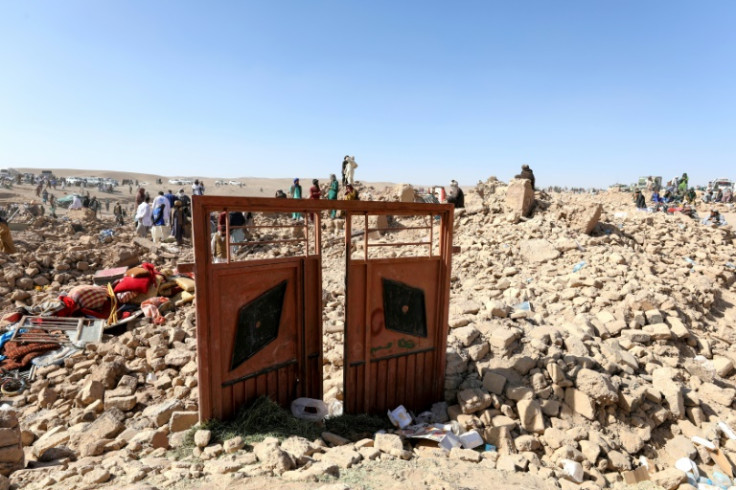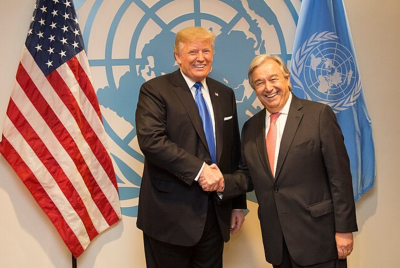Afghanistan Earthquake Death Toll Nears 3,000 After Fatal Earthquake Hit the Herat Province
Afghanistan is struggling to recover from the 6.8 magnitude earthquake that shattered several villages on Saturday morning.

More than 2,500 people have been reported dead after a fatal earthquake hit the Herat province in Afghanistan on Saturday morning, 7 October.
Vehicles carrying a huge load of humanitarian aid attempted to enter the region soon after the catastrophic incident, but the support workers were pushed back and delayed by blocked routes and communication lines being down.
It was only today, Monday 9 October, that humanitarian aid started to trickle into to region where villagers had since taken to digging potential survivors out of the fallen rubble with their bare hands.
A rescue worker in the Herat province, told reporters: "There is no modern equipment nor trained search and rescue teams. This could result in a rise in casualties. If we don't urgently receive advanced and trained rescue teams in the area soon, we will see an increase in the loss of lives that could have been avoided,"
The earthquake, which left villages in the rural districts barren and covered in debris, struck the nation at a huge 6.3-magnitude.
Devastating earthquakes have taken a heavy toll on Afghanistan, claiming over 2,445 lives. Let’s extend our support to those in need. 🇦🇫 #AfghanistanEarthquake pic.twitter.com/RVkrX2zAIy
— Sep (@sseyyedd) October 9, 2023
In the epicentre of the quake, lies Zindajan, a rural district around 25 miles away from Herat city. UN Office for the Coordination of Humanitarian Affairs (OCHA) reported that "100 per cent of homes are estimated to have been completely destroyed".
It has been highly acknowledged, that the rural regions of Afghanistan have been forced to bear the brunt of the rocking.
Nek Mohammad, a resident of a village who managed to escape the fatal outcome of the earthquake on Saturday, told reporters: "We came home and saw there was nothing left. Everything had turned to mud."
Speaking of the Afghan citizens who have been forced to desperately dig out loved ones with their hands and shovels, he added: "We started to dig with shovels and whatever we had to rescue women and children from the rubble."
Despite not being recognised as the formal government of Afghanistan, the Taliban leaders were called on to estimate the mounting death toll of civilians in the crumbled areas.
But with no population records for such villages, both the Taliban and aid organisations struggled to recall a figure for fatalities and missing person reports.
It has since been reported that the rural villages were home to displaced people and families who fled the ongoing conflict and drought in Afghanistan, explaining the lack of population records.
This was the moment a young child was found alive under the rubble after a magnitude 6.3 earthquake hit western Afghanistan on Saturday ⤵️ pic.twitter.com/l2iEGehhEJ
— Al Jazeera English (@AJEnglish) October 9, 2023
The medical charity Médecins Sans Frontières (MSF) and other volunteers have been working in hospitals in the most affected regions and Herat Regional Hospital, where the number of injured people has surpassed 1,600.
Reports note that more than 10,000 people are expected to be injured after several aftershocks hit the country as people scrambled to safety.
Sources on the ground have called the hospitals "ill-equipped" and "overwhelmed".
Prue Coakley, the acting country representative for MSF in Afghanistan, said: "Many of them do not have homes to return to, that is why many of them are remaining in the hospital while authorities look for alternative places for them to stay."
Doctors at Herat Regional Hospital told the BBC that women and children account for most of those who are dead.
Since the Taliban regained power in Afghanistan in 2021, the country has been surviving an economic crisis.
With fears of funding the brutality of the Taliban, who have essentially turned the lives of Afghan women and girls into a "mass graveyard", only a few countries have pledged money to the 'authorities'.
Media outlets in China announced that China's Red Cross had donated $200,000, equal to £164,220, to the cause.
Despite ordering Afghan refugees and asylum seekers to leave Pakistan, the Pakistani authorities are expected to abide by their contract with Afghan officials and donate funding.
The contract, between Pakistani and Afghan officials, states that the country will "extend all possible support to the recovery effort".
© Copyright IBTimes 2025. All rights reserved.





















